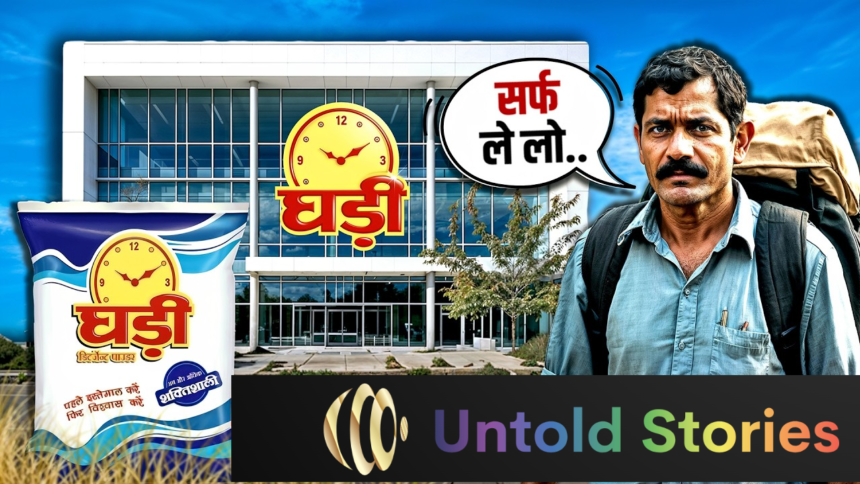Description
Learn about the Ghadi Detergent success story and how the founders’ vision and determination led to the brand’s overwhelming success. This is the Success story of Ghadi detergent powder, from its humble beginnings to becoming a household name across India.
Success Story
Friends, today everyone knows this tagline of Ghadi detergent, but when this brand was started, the company did not even have enough money to do its advertising. That’s why two brothers gathered courage and started selling it door to door, sometimes on foot and sometimes by bicycle. But when Ghadi detergent came into the market, on one side it was facing competition from Nirma and on the other side, a big giant like Hindustan Unilever was standing in front of it along with Surf and Wheel.
But then Ghadi did something that today it became one of the largest detergent brand in India. After all, what strategies did this company adopt and how much struggle was this journey? Let’s know everything in today’s Blog. So friends, if we look at the history of detergent, it was started at the global level at the time of World War II. But at that time it was far away from the reach of Indians.
But then 10 years after independence i.e. in 1957, a company named Swastik Oil Mills started manufacturing synthetic detergent and thus it was introduced in India but still it was able to make its place in very few homes. However, when Hindustan Unilever launched its famous Surf Excel in India in 1959, it was advertised very rapidly. Due to which detergent powder started becoming popular very fast among the people. But yes, till now most of the population of India was poor, hence Surf Excel targeted only the elite class families.
Because Its detergents were so expensive that the middle or lower middle class could not afford them. And then understanding this as a problem, Karsan Bhai Patel of Gujarat launched Nirma Detergent, which became India’s largest selling detergent brand in a few decades. Now friends, this success story of Nirma reached two brothers named Muralidhar and Vimal Kumar Gyanchandani of Kanpur and they were greatly inspired by it.
He thought why not carry forward his father’s business, which at that time used to make soap from glycerine. With this thought in mind, in 1987, these two brothers living in Shastri Nagar, Kanpur, opened a small factory of detergent near Fazalganj Fire Station which was named Shri Mahadev Soap Industry and then the first domestic soap was made in the factory itself. detergent powder. Now friends, even though this factory of Fazalganj was small, the aspirations of these brothers were very big.
Therefore, he started working with full hard work and passion. However, his business could not survive for a long time because there were many popular products in front of him like Nirma and Hindustan Unilever’s wheel, which were not at all easy to overcome. Although he was already aware of this, that is why he never lost patience and kept convincing people from shopkeepers to the street to buy detergent. However, when despite many efforts he was not able to make profits, he understood that he had to do something which other companies were not doing.
At a time when most of the washing powders were yellow or blue in color, he decided to make white colored washing powder and launch it in the market. Apart from this, Gyanchandani Brothers also gave a strong and tongue-in-cheek tagline, first use, then trust. People liked this tagline very much and they thought that when the company has so much confidence in its product then why not give it a try. And then when people used it, they liked the foam and whiteness of this detergent very much.
Now consumers’ trust in this product started increasing and gradually Ghari’s washing powder and cake started becoming popular in Kanpur and surrounding areas also. After the success in Kanpur, its founders thought why not distribute it in entire UP, because obviously it is the largest state of India. Let us tell you that 70 percent contribution of total FMCG sales was from UP only. In such a situation, there could not have been a better market than this to experiment. But friends, apart from being good, it was also a tough market because due to high demand there was a lot of competition. In such a situation, the watch took a big step to deal with this problem.
Because while other companies were giving only six percent commission to their distributors, Ghadi started increasing it to nine percent. Now the effect of higher commission is that distributors started preferring watches over other company’s products. And this was the reason that the availability and visibility of the watch increased a lot in the market and now it was easily available in every small shop of the street and locality. Due to which the sales of the company started increasing very rapidly.
But friends, paying high commission also meant that Ghadi had to run his business with very little profit and there was a danger of going into loss. And friends, to deal with such problems, they started making various cuts in expenses. For example, to reduce transportation costs, the company started building a small unit or depot every 200 to 300 kilometers. Due to which not only the cost of transportation was reduced but also the products started reaching people faster than before.
In this way, within a few years, Ghadi detergent became the most liked brand in UP and then this success motivated the company to enter the surrounding states also. After which the watch was started selling in Bihar, Madhya Pradesh and many states adjacent to UP. Now friends, because of UP, the whole idea of the market had already stuck to Ghadi Detergent. That is why gradually it started expanding its presence in big cities like Delhi and Mumbai and then by 2002, the watch had achieved sales of Rs 500 crore, which was a huge success for the company. After this the company started manufacturing many more products and it became FMCG.
Started strengthening its presence in the market. Gyanchandani changed the name of Shri Mahadev Shop Industry to Rohit Surfactant Private Limited i.e. RPL in the year 2005 to integrate all its products with each other, so that their operations could be simplified. Meanwhile, due to less innovation and changing market trends, Nirma was gradually losing its position, which Ghari started getting full benefit of and then Ghari went on capturing Nirma’s market share. Besides, Ghari also launched its products in many other sectors.
For example, in the year 2010, RSP started a unit in Haridwar, from where new products like hair oil, shampoo, toothpaste, moisturizer, shaving cream and liquid hand wash were launched in the market. In the next year i.e. 2011, it became the largest player in the Indian detergent market, leaving behind many brands like Ghari, Wheel and Nirma. But how did all this happen? Can a company become so successful in such a short time just by paying high commission to distributors and making white detergent?
The answer is absolutely not, because Ghari adopted many such strategies which have played very important roles in its success. First of all, it understood the minds of consumers. For example, most of its customers were female housewives, who equated more foam with better quality and used extra detergent to get lots of foam. In such a situation, Ghari understood these insights and started advertising itself in such a way that their detergent gives the highest lather. Also first use, then trust.
Due to this confidence claim, customers started becoming curious to try this new product. But this tagline would have died decades ago in some street locality of Kanpur, if Gyanchandani had not given priority to the advertisement of his products. Today you may see big stars like Madhuri Dixit and Amitabh Bachchan advertising watches, but in the initial days, watches themselves were going through struggle and were trying to survive by cutting expenses. Like, neither could he make any superstar as brand ambassador nor did he have the money to run an ad campaign on a large scale.
But how to make people aware about your product without any advertisement. For this Gyanchandani took a very smart decision. He got a watch advertisement painted on the exterior of a major train in the North Indian state. Just look at this advertisement on Pushpak Express and Swarna Jayanti Express. Apart from the exterior of the train, small posters were also put up in the internal coaches, which increased the brand visibility a lot.
The company always aimed to keep its ad space very minimal and spend only two percent of its sales on advertising. And friends, to stick to this strategy, Ghari kept its advertising activities in-house, which saved them from additional expenses on advertising agencies or middlemen. Apart from this, when Gyanchandani wanted to start his detergent brand, he saw that there was only one premium and high priced product which was heavy on the pockets of most people.
On the other hand, Nirma was a cheap alternative for those who wanted to use detergent but were not ready to pay much for it. Now, due to it being cheap, many people started feeling that Nirma is a low quality product. In such a situation, there was no option in the market for those people who wanted a better product than Nirma but also wanted it not to be as expensive as Surf. In such a situation, Gyanchandani thought of entering this segment and started positioning his brand as a better quality alternative to Nirma.
And friends, the company also showed a lot of cleverness in keeping the price of Ghari and while Nirma was selling its detergent at just Rs 30 per kg, Ghari started selling it at Rs 35 per kg. However, it was also a risky decision because Nirma was the biggest competitor and market leader of watches. In such a situation, weighing it with the higher price became a big challenge for the company.
But Ghari remained confident on the quality of its product and kept encouraging consumers through its advertising campaigns and then gradually the perception developed among people that Ghari is a premium product at an affordable price. Now friends, when the company started with a small factory, its founders knew that at this time they did not have enough capital to distribute their products at the national level. So he started with a very small goal and targeted only Kanpur market.
Now when the brand became successful in Kanpur, it focused on its home state i.e. Uttar Pradesh and after the success here, the company had so much money that if it wanted, it could have been aggressive and expanded its presence in far flung areas. Could distribute the products. But he chose his neighboring states like MP, Bihar, Punjab and Haryana so that he could understand what is the demand of consumers other than UP, what kind of ad campaigns work there and how to market his products in those regions. Can be combined with.
For this, Ghadi got many magic shows done. Set up your stall in the fair, showcased your products in the exhibition and worked on many similar strategies. Due to which people from tier two and tier three also started connecting with this brand and within no time it became the favorite brand of the entire country. This is the reason that today out of every four detergent brands sold in the country, only one is sold in pitcher form. The operation of the company is still completely in the hands of the family. Murali and Vimal Gyanchandani handle the daily operations.
The marketing of the brand is handled by Vimal’s sons and Murali’s sons are also an important part of the company. But friends, let us tell you that apart from detergent, their business is also strongly spread in the dairy sector and many of you must be aware of their dairy brand Namaste India. Apart from this, in 1995 the company also entered the manufacturing business and established Lian Global Private Limited. And friends, this is the same Ryan Global whose Red Chief boots you wear very fondly.
Now if we look at the current performance, Ghadi Detergent is doing very well in its segment. But it cannot be denied that the competition in this segment is very tough and watches are being competed not only by big players like Surf or Ariel but also by many regional brands like Nirma, Faena, Mr. White. So friends, the way Nirma Ghadi was the inspiration for detergent in the beginning, keeping the same in mind even today, pitchers should learn a lesson from Nirmal’s mistake and take some strategic steps to sustain their growth.
Like watches should invest more and more in their R&D. Focus should be on developing new products and improving existing products so that they can remain ahead in the market. Also, it is very important to understand the changing market demand and consumer preferences for watches, otherwise it can also be left behind like Nirma. Apart from this, there is one more thing on which the watch must work and that is its distribution network. Now you must be wondering what went wrong with it. Actually Ghari is a detergent brand.
Only people of some states of North Side know this. Whereas Southern State is still completely unaware of this. In such a situation, to maintain its legacy, Ghari should establish its Pan India present so that it can get an even bigger consumer base. And friends, if Ghadi adopts strategies then it can maintain its current success and legacy for a long time.
Anyway, see you again with the powerful explanation of the Success Story.



